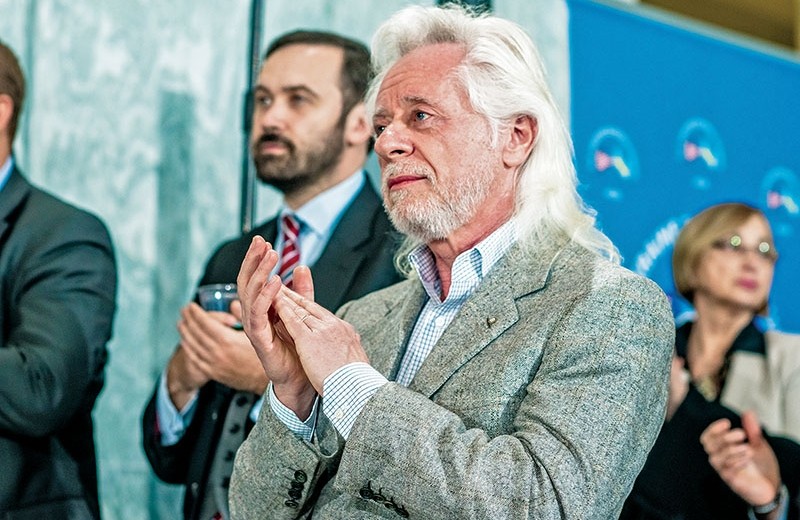The Kharkiv native who brought Volia Cable, beauty and health chain Kosmo and tons of food to Ukraine is trying to help rouse the West for the civilizational struggle under way.
Michael Bleyzer, 63, the president of SigmaBleyzer private equity fund, sees Russia’s war against Ukraine in epic terms.
A decade ago, when Russian President Vladimir Putin called the collapse of the Soviet Union the greatest geopolitical catastrophe of the 20th century, many in the West dismissed it as harmless nostalgia.
Not Bleyzer. “It was a call for action,” Bleyzer said. “We see the results played out all over Europe. It will not really stop and will continue.”
But he’s not confident that Western leaders are up to the task yet of capitalizing on Ukraine’s resurgent patriotism, unity and willingness to fight.
Bleyzer called the response from the West “still significantly insufficient” and favors arming Ukraine because Russians, in the grips of another imperialist leader, “only relate to the language of strength and not appeasement.” Economic sanctions have slowed down Putin, but haven’t stopped him, he said.
“I do fear that it will take a very large escalation of the war for the West to refocus,” Bleyzer said. “There’s a lack of understanding what’s going on. I am not optimistic that the West will take decisive steps even if there is a signficant escalation.”
Bleyzer and his wife, Natasha, fled the Soviet Union’s “evil empire” more than 38 years ago after encountering anti-Semitism that blocked his career path. He settled in Houston, Texas, which the Ukrainian-American now considers home.
But his attachment to his native country remains for many reasons, not least because of the $1 billion in private investment he’s raised, mainly for Ukraine projects since 1994. Most of the investments he manages are in Ukraine’s agricultural sector. His AgroGeneration firm has 120,000 hectares under cultivation in five oblasts, but he’s also been involved in Kosmo beauty and health chain, Volia Cable and Dominic confectionery in Poltava.
The assets under management aren’t worth a billion dollars now. When asked how much they’ve lost in value, he replied: calculate the decline of the hrvynia in the last two years to get an estimate.
“This is unquestionably the most difficult time since we started investing in Ukraine,” Bleyzer said.
But he sees the way ahead.

President Petro Poroshenko speaks with head of the European Commission Jean-Claude Juncker in front of the Presidential Administration in Kyiv on April 27.
“There’s not enough going on in ecnomic reform and real progress in Western values. People are in transition for more than 20 years. They’re desperate,” Bleyzer said. “While we have a serious problem, 97 percent of Ukrainian territory is free to move on reforms. That hasn’t taken place. That’s the biggest disappointment and missed opportunity that is taking place.”
Bleyzer and others have developed a five-step strategy to help secure Ukraine’s victory: a social stabilization program; foreign direct investment and free trade agreement, institution-building; countering Russian propaganda; and winning the social media war.
The components are intricately linked.
If money and hope don’t reach impoverished rural areas soon, Bleyzer said, the desperation will post a threat to national security.
“They don’t care about geopolitical issues. They are primarily focused on their survival. They need something to help them move forward,” Bleyzer said. “They feel they don’t have anything to defend. With relatively small contributions, you can change the attitudes of the people very quickly.”
The next pieces include government-backed political risk insurance, to break the drought in investment in Ukraine, and a free trade agreement between the U.S. and Ukraine, to spur the economy.
“The appetite of investors is non-existent,” he said.
The remaining two pieces are part of a public-relations offensive to blunt Russia’s success in keeping American public opinion in a “gray area,” unlike Soviet times, when the demarcation between good and evil was clear.
In Bleyzer’s worst-case scenario, which he considers unlikely, Russia overruns Ukraine and triggers a wider war.
In the best-case scenario, which he thinks is more likely, Ukraine repels Russia’s military invasion and creates an attractive investment climate.
“The president and prime minister really produce clear reforms, corruption is killed, the ‘nomenklatura’ is finished, public sector reform takes place, and clear civilized, market-based economy emerges,” Bleyzer said. “If that takes place very quickly, within months, the results can be seen in a couple of years.”
That would mean breaking out of the freeze he is in now — merely holding on to assets and surviving, rather selling assets and raising fresh investment for new acquisitions.
The fundamentals, Bleyzer said, remain bright, especially in agriculture. In grain alone, Ukraine consumes only 25 million tons of grain, yet has the potential to boost yields to 150 million tons from the current 60 million tons, thereby becoming “by far the largest grain exporter in the world.”
And that’s why, with the exception of Russia, he’s still investing in Ukraine and other emerging markets. “That’s where I see the greatest potential.”



